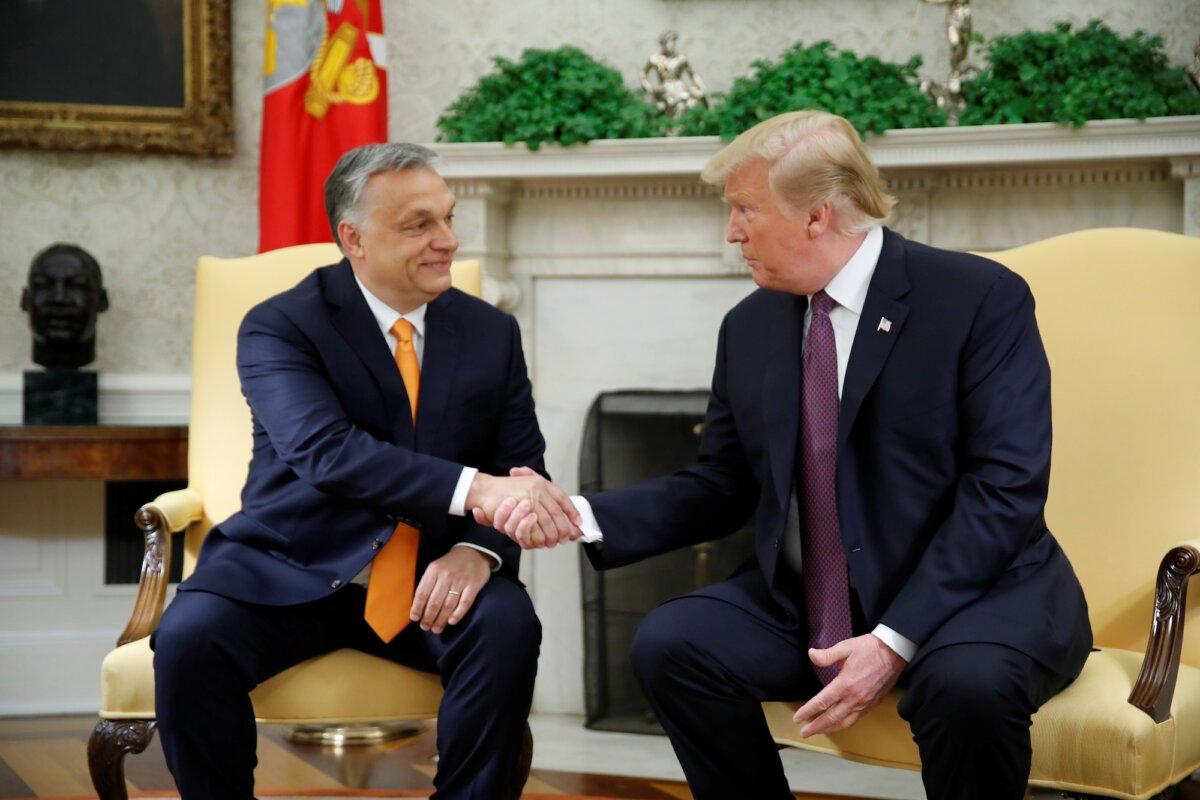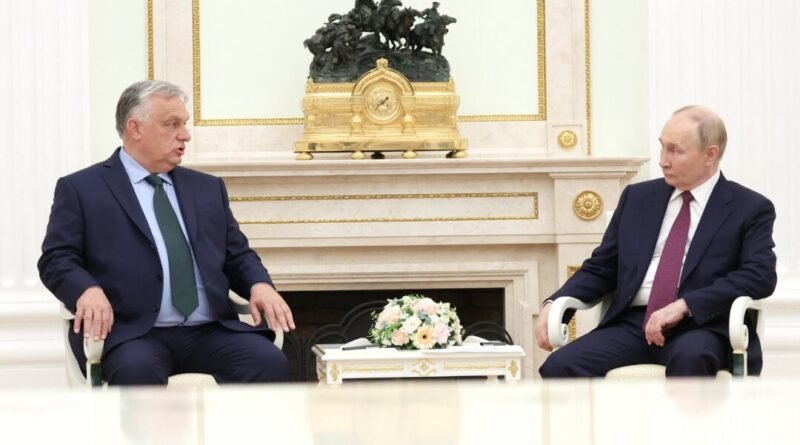EU Parliament condemns Hungarian Prime Minister Orban for holding talks with Russian President Putin in Moscow
Orban recently met the leaders of Russia and China—and presidential frontrunner Donald Trump—as part of a self-styled ‘peace mission.’
Nationalist-minded Hungarian Prime Minister Viktor Orban has received a dressing down from the European Parliament for visiting Moscow earlier this month, where he met with Russian President Vladimir Putin.
On July 17, the Strasbourg-based parliament passed a resolution condemning Mr. Orban’s trip to Russia, which, it said, “does not represent the European Union and is a blatant violation of the EU’s treaties and common foreign policy.”
The resolution, which also stresses the EU’s continued support for Ukraine, asserted that Budapest should “face repercussions for these actions.”
A large majority of EU lawmakers—495—voted in favor of the resolution, while 137 voted against it. Forty-seven abstained.
On July 1, Hungary assumed the European Union’s six-month rotating presidency, which allows it to plan and organize EU events and meetings.
According to EU officials, however, the role does not authorize Mr. Orban to conduct diplomacy on behalf of the 27-nation bloc.
Despite Russia’s ongoing invasion of eastern Ukraine, now in its third year, Hungary under Mr. Orban has kept relatively good relations with Moscow.
Except for Slovak Prime Minister Robert Fico, Mr. Orban is the only EU leader who has called for a diplomatic solution to the conflict.
Like his Slovak counterpart, he is also a vocal critic of unqualified Western support—military and otherwise—for Ukraine.
Peter Szijarto, Hungary’s foreign minister, has defended what Mr. Orban calls his “peace mission,” which also took him to Kyiv, Beijing, and Florida.
“It’s unacceptable to stigmatize a country for advocating diplomatic solutions,” he said in a July 16 statement posted on social media by a spokesman for Mr. Orban.
“In other conflicts, the EU has always called for peace and disarmament. Now, with Ukraine, they push for more conflict.
“We must not be labeled as ‘Putin’s puppet’ or ‘Kremlin propagandist’ for advocating dialogue and peace.”

‘Europe Needs Peace’
The day after Hungary assumed the rotating EU presidency, Mr. Orban visited Kyiv, where he met with Ukrainian President Volodymry Zelenskyy.
Three days later, he visited Moscow, where he held talks with Mr. Putin.
It was the first time for an EU leader to meet Mr. Putin in Moscow since April 2022—two months after Russia launched its initial invasion of eastern Ukraine.
Speaking to reporters afterward, Mr. Orban said the conflict had led to the “destruction of [Europe’s] economic development and the decline of [its] competitiveness.”
“In short, I told the [Russian] president that Europe needs peace,” he said.
“We will serve as an important tool in making the first steps towards peace. This is what our peace mission is about.”
Mr. Putin said the talks were useful but blamed Kyiv for refusing to consider peace talks.
“We have always been—and remain—open to discussing a political and diplomatic settlement,” he said.
The meeting in Moscow drew sharp rebukes from Mr. Orban’s fellow EU leaders, while Kyiv complained it had not been consulted beforehand.
“Only unity and determination will pave the path to a comprehensive, just, and lasting peace in Ukraine.”

‘Diplomatic ‘Adventurism’
Nevertheless, Mr. Orban’s self-styled “peace mission” was far from over.
On July 8, he paid a surprise visit to China, which has drawn ever closer to Russia since the latter first launched its invasion of eastern Ukraine.
In Beijing, Mr. Orban met Chinese leader Xi Jinping, with whom he reportedly discussed prospects for achieving peace in Ukraine.
“It is in the interests of all parties to seek a political solution through an early ceasefire.”
In subsequent remarks, Mr. Orban described China as a “key power in creating the conditions for peace in the Russia–Ukraine war.”
On July 11, Mr. Orban traveled to the United States and met former U.S. President Donald Trump at his Florida residence.
In a social media post, former President Trump thanked the Hungarian leader for his diplomatic efforts.
“There must be PEACE, and quickly,” he wrote. “Too many people have died in a war that should have never started!”
Kyiv, he said, has “grave misgivings about any effort to negotiate some kind of fake peace with Russia without the Ukrainians being at the heart of that effort.”
“Whatever adventurism is being undertaken without Ukrainian consent … is not something that’s consistent with the policy of the United States,” Mr. Sullivan told reporters on July 16.
On the same day, in an open letter to fellow EU leaders, Mr. Orban claimed that the former U.S. president—if reelected—would “immediately” act to broker a diplomatic settlement between Russia and Ukraine.
He said that former President Trump already had “detailed and well-founded plans for this.”
In a written response to Mr. Orban cited by Western media outlets, European Council President Charles Michel clarified that the EU’s rotating presidency “has no role in representing the [European] Union on the international stage.”
Nor, he added, had it received a mandate from the European Council to “engage on behalf of the union.”
The Kremlin has said it is unaware of former President Trump’s purported plan to broker a peace deal.
Meanwhile, Mr. Orban’s “peace mission” has sent shockwaves across EU officialdom.
On July 18, EU member Denmark said it would refrain from sending officials to meetings arranged by the EU presidency to protest against Mr. Orban’s unsanctioned actions.





